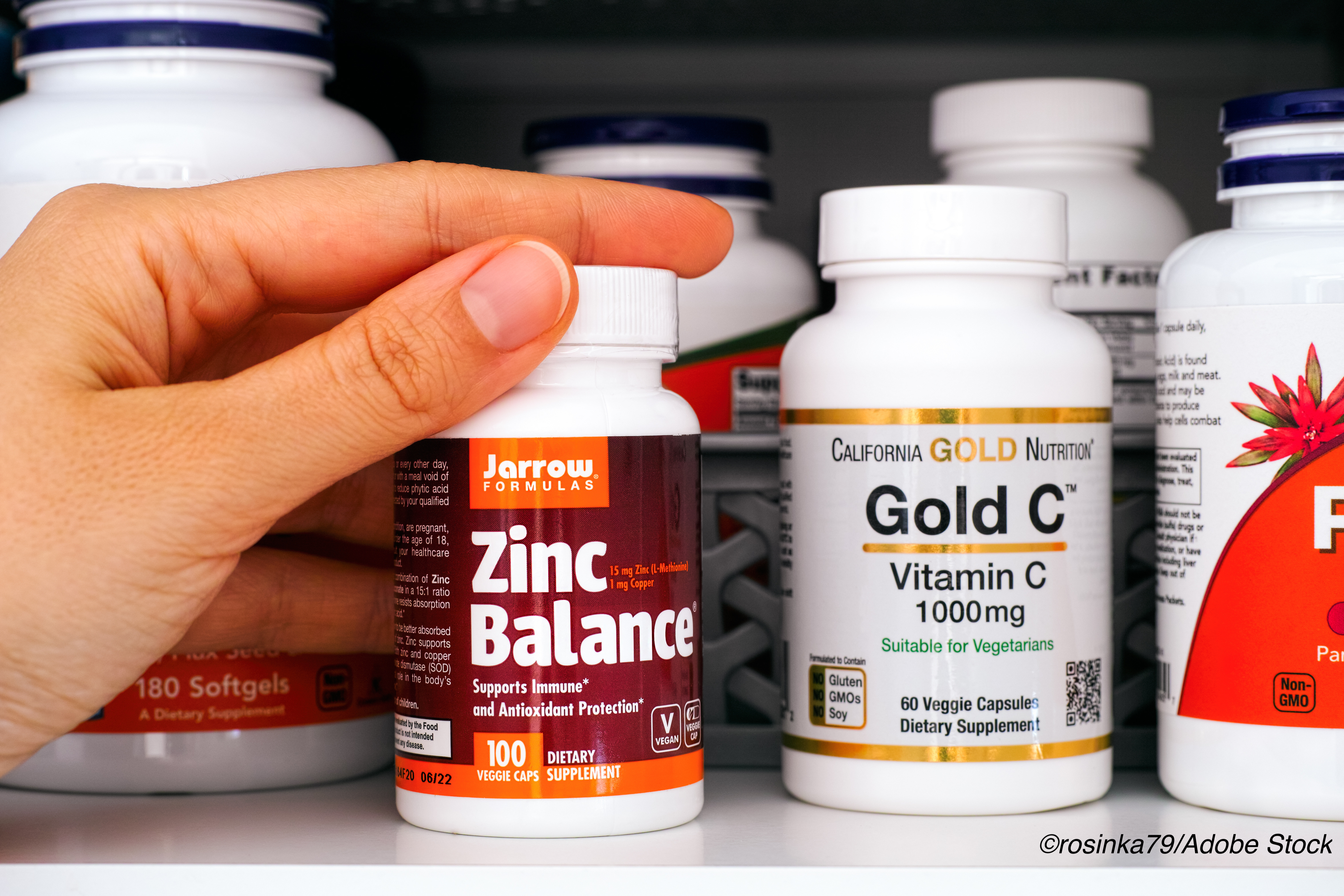Use of the over-the-counter supplements zinc gluconate or vitamin C was not associated with significant declines in symptom duration among non-hospitalized patients with confirmed SARS-CoV-2 infection in the Covid A to Z randomized clinical trial.
The Cleveland Clinic Health System study was conducted between late April and mid-October 2020 in ambulatory patients taking high-dose zinc and high-dose ascorbic acid, either alone or in combination. The trial was stopped early due to a low conditional power for benefit. Findings were published online Feb. 12 ahead of print in JAMA Network Open.
Zinc and ascorbic acid are commonly used by people with viral infections, and the researchers noted that there is “limited evidence” that high doses of the over-the-counter supplements may shorten the duration of the common cold or reduce symptoms.
They characterized the data on oral ascorbic acid and zinc in patients with colds as “inconsistent,” with some trials suggesting that high doses of ascorbic acid and zinc gluconate may reduce the duration of common cold symptoms, and decrease the severity of symptoms, while other studies have shown no benefit.
The Covid A to Z study was designed to include around 500 patients with confirmed Covid-19 who were not hospitalized, but recruitment was stopped at 214 patients. These patients were randomized 1:1:1:1 to receive 10 days of treatment with zinc gluconate (50 mg), ascorbic acid (8,000 mg), both supplements, or standard of care.
The primary endpoint was number of days required to reach a 50% reduction in symptoms, including severity of fever, cough, shortness of breath, and fatigue rated on a 4-point scale for each symptom.
Secondary endpoints included days required to reach a total symptom severity score of 0, cumulative severity score at day five, hospitalizations, deaths, adjunctive prescribed medications, and adverse effects related to use of the supplements.
The Cleveland Clinic operational and safety monitoring board (OSMB) overseeing the study met on Oct. 23, 2020, and recommended stopping the trial for futility, based on futility criteria met for the three active treatment groups compared to usual care. Data on 214 patients enrolled at the time of study termination were included in the analysis.
The mean age of the study participants was 45.2 years (14.6), and 132 (61.7%) were female.
Patients who received usual care without supplementation achieved a 50% reduction in symptoms at a mean (SD) of 6.7 (4.4) days compared with 5.5 (3.7) days for the ascorbic acid alone group, 5.9 (4.9) days for the zinc gluconate group, and 5.5 (3.4) days for the group receiving both supplements (overall P=0.45, log-rank P=0.25).
No significant difference was seen in any of the secondary outcomes, including number of days to reach no fever, cough, shortness of breath, or fatigue. The mean composite 4-symptom score at day five was 3.2 points, and this was consistent among all treatment groups.
The data safety monitoring board noted four serious adverse events, including three patients who died from Covid-19 and another patient admitted to the hospital for a COPD exacerbation during the study period. None of these events were attributed to supplement use.
Study limitations cited by the researchers included the open-label design and the recruitment of patients from a single health system.
And, since the study included only outpatients with Covid-19, the generalizability of the data to patients hospitalized with the disease is not known.
In a commentary published with the study, Erin Michos, MD, MHS, of the Johns Hopkins Ciccarone Center for Prevention of Cardiovascular Disease, Baltimore, and Miguel Cainzos-Achirica, MD, PhD, the Houston Methodist DeBakey Heart & Vascular Center, wrote that the disappointing findings in the Covid A to Z randomized trial and in trials of other agents such as hydroxychloroquine should not discourage future research efforts critical to finding truly effective treatments for Covid-19.
“The groundbreaking developments in antiviral therapeutics against a foe as challenging as HIV provide strong, evidence-based reasons for hope in science and human discovery,” they wrote. “Despite the urgency, we suggest that some pause may be needed moving forward. Although supplements are generally thought of as benign because of their over-the-counter availability, they are not necessarily free from adverse effects. Indeed, in the Covid A to Z Study, more adverse effects (nausea, diarrhea, and stomach cramps) were reported in the supplement groups than in the usual care group.”
- Use of the over-the-counter supplements zinc gluconate or ascorbic acid was not associated with significant declines in symptom duration among non-hospitalized patients with confirmed SARS-CoV-2 infection.
- No clinically meaningful difference in time to symptom reduction was seen among the ambulatory patients taking high-dose zinc, high-dose ascorbic acid, a combination of both, or neither supplement.
Salynn Boyles, Contributing Writer, BreakingMED™
The study was conducted and funded by Cleveland Clinic. Researcher Milind Desai reported receiving consulting fees from Gilead Sciences, and receiving grants from Myokardia unrelated to the study.
Commentary writers Erin D. Michos and Miguel Cainzos-Archirica reported no relevant conflicts.
Cat ID: 190
Topic ID: 79,190,730,933,190,926,192,927,151,928,925,934


